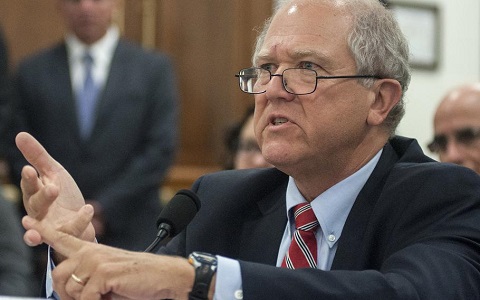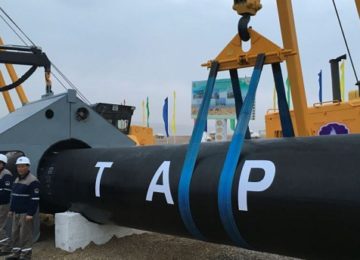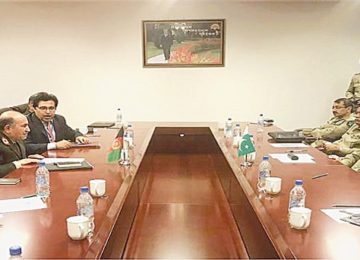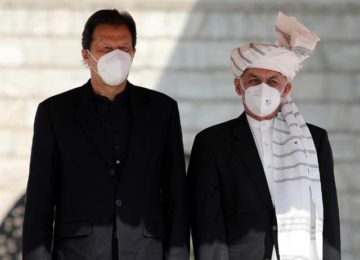November 01, 2021
Special Inspector General for Afghanistan Reconstruction John Sopko discussed the office’s 53rd Quarterly Report to Congress at the Military Reporters and Editors Association Conference on October 29, 2021. Mr. Sopko shared details of the corruption and lack of oversight which led to the collapse of the Afghan government in August. Below are the key takeaways from his speech:
- U.S. agencies have not made honest reporting easy for SIGAR – or for the Congress about America’s longest war. A recent example of this bureaucratic inclination to try to restrict public information is that shortly after the fall of Kabul, the State Department wrote to SIGAR and other oversight agencies requesting to “temporarily suspend access” to all “audit, inspection, and financial audit…reports” on our website because the Department was afraid that information included in those reports could put Afghan allies at risk.
- Despite repeated requests, State was never able to describe any specific threats to individuals that were supposedly contained in our reports, nor did State ever explain how removing our reports now could possibly protect anyone since many were years old and already extensively disseminated worldwide. Nevertheless, with great reservation, I acceded to State’s initial request because it was made at the height of the emergency evacuation from Afghanistan.
- The full picture of what happened in August – and all the warning signs that could have predicted the outcome – will only be revealed if the information that the Departments of Defense and State have already restricted from public release is made available.
- The Congress has tasked SIGAR with a number of assignments since the collapse of the Afghan government. Rather than attempting to impede SIGAR’s work, the current Administration should help us deliver the answers Congress has demanded. I fervently hope that they take that view. But as SIGAR has experienced in the past, good intentions for transparency by senior leaders are frequently thwarted by bureaucratic inertia or fear of the public knowing the truth.
- The Congress, press, and SIGAR – using all of our legal authorities – must continue to pursue leads and demand answers. To answer these questions, we must find out what our government knew, when it knew it, and what it did with that information. SIGAR’s investigators are already interviewing Afghans who were evacuated to the United States to see what information they may be able to provide about corruption and other nefarious activities by former Afghan officials; SIGAR’s auditors and subject matter experts have already interviewed U.S. and Afghan government and military officials to start to put together the full picture of everything that happened that ultimately led to the Taliban takeover just over two months ago.
- It is up to all of us – at SIGAR, in Congress, and in the press, to ask the questions that must be asked and uncover the answers, no matter how unpleasant they may be. I sincerely hope we will have cooperation from every corner of the U.S. government as we undertake our work.
The complete remarks made by John F. Sopko, Special Inspector General for Afghanistan Reconstruction, in his Friday briefing to the Congress are given below:
Thank you for that kind introduction, and thanks to Jeff Schogol and the Association for inviting me to speak today. This is quite a novel experience for me since the last time I spoke in person to a group was on March 10th, 2020, at Syracuse University – and, the very next day Governor Cuomo shut the entire university down. So, 10,000 zoom meetings later, it is great to be back live and not have to hit the video button anymore – but it is weird to have to wear pants, isn’t it?
As many of you know, SIGAR issued its 53rd Quarterly Report to Congress earlier today. This quarterly report is also unique – as it is the first issued in SIGAR’s 12-year history when there is not a single U.S. service member deployed to Afghanistan or any civilians manning Embassy Kabul.
Those of you who have followed SIGAR’s work know that many of the reasons for the unexpectedly quick collapse of the Afghan government are problems that SIGAR has reported on for years – corruption; ghost soldiers; the dependence of the Afghan military on U.S. airpower, contractors, and other enablers; and incompetent Afghan leadership, to name but a few.
Some of you have suggested that SIGAR may be the only U.S. government agency whose stock has risen in the wake of our withdrawal, due to our penchant for telling inconvenient truths for the last ten years. But you and the press corps must also be credited for telling ground truths from the beginning of the war through the evacuation of Kabul, to this very day. And without amplification of our reports by the press, SIGAR would have not have as effective as we have been.
But we all know that U.S. agencies have not made honest reporting easy for SIGAR – or for you about America’s longest war. We have a recent example of this bureaucratic inclination to try to restrict public information. As we report in today’s Quarterly report, shortly after the fall of Kabul, the State Department wrote to me and other oversight agencies requesting to “temporarily suspend access” to all “audit, inspection, and financial audit…reports” on our website because the Department was afraid that information included in those reports could put Afghan allies at risk.
Let me be clear, I strongly believe that Afghans who are at genuine risk of reprisal due to work they conducted for the United States government, NGOs, news outlets, and other groups should and must be protected. The protection of Afghans at legitimate risk of harm is not an issue to quibble over and something our agency has respected since my appointment 10 years ago.
But despite repeated requests, State was never able to describe any specific threats to individuals that were supposedly contained in our reports, nor did State ever explain how removing our reports now could possibly protect anyone since many were years old and already extensively disseminated worldwide. Nevertheless, with great reservation, I acceded to State’s initial request because it was made at the height of the emergency evacuation from Afghanistan.
Recently, I received a second letter from the State Department. They stated they had reviewed the relatively few materials remaining on SIGAR’s website and included a spreadsheet containing roughly 2,400 new items they requested redacting.
Given how hard the Department reportedly was working to evacuate Americans from Afghanistan and resettle Afghan refugees, I was surprised they found the time to go through every one of our reports and compile such an exhaustive list. Nevertheless, upon reviewing their request, it quickly became clear to us that State had little, if any, criteria for determining whether the information actually endangered anyone – and I think you will agree with me that some of the requests were bizarre to say the least.
For example:
- State requested we redact Ashraf Ghani’s name from our reports. While I’m sure the former President may wish to be excised from the annals of history, I don’t believe he faces any threats simply from being referenced by SIGAR.
- State requested we consider redacting a reference to “Redstone Arsenal, Huntsville, Alabama.” This may come as a surprise to the many of you who have visited the base but somehow its name is a threat to some Afghan, or possibly by saying its name publicly it is a threat to Alabama.
- State also asked us to consider redacting the name of a USAID official who publicly testified before Congress in 2017 even though his testimony remains on the House Foreign Affairs Committee website, and the hearing video remains available.
These are but a few examples, nevertheless, SIGAR conducted a risk-based assessment and reviewed each one of the approximately 2,400 redaction requests and found all but four to be without merit. We made these redactions, but the remaining material – including, after another internal review, SIGAR’s audits and inspection reports – is now available unadulterated on SIGAR’s website.
No audience better understands the dangers of limiting public access to information in the name of “security.” And simply because the war in Afghanistan has concluded does not mean the American people – or its elected representatives – do not have a right to know the truth about what happened in Afghanistan over the last 20 years.
To that end, Congress has tasked SIGAR with a number of assignments since the collapse of the Afghan government. They include reports on:
- Why the Afghan government collapsed in spite of the $146 billion reconstruction effort;
- Why the Afghan security forces collapsed and how U.S. train, advise, and assist efforts may have contributed to that collapse;
- Continued risks to U.S.-funded reconstruction assistance, including any contracts that may still be active or pending;
- The extent to which the Taliban may have access to previously provided U.S. government funding and equipment left behind;
- The status of and potential risks to the Afghan people and civil society organizations, including Afghan women and girls, journalists, educational institutions, health care operations, and non-government institutions resulting from the Taliban’s return to power;
- Whether Afghan government officials fled the country with U.S. taxpayer dollars; and
- A comprehensive joint audit with the State Department IG looking into the administration of the Special Immigrant Visa program in Afghanistan.
In my opinion, the full picture of what happened in August – and all the warning signs that could have predicted the outcome – will only be revealed if the information that the Departments of Defense and State have already restricted from public release is made available.
For example, DOD restricted from public release a range of information going back to 2015 on the performance of the Afghan security forces, purportedly at the request of the Afghan government. This included information such as casualty data, unit strength, training and operational deficiencies, tactical and operational readiness of Afghan military leadership, comprehensive assessments of Afghan security force headquarters leadership; and operational readiness rates down to the corps level. In essence, nearly all the information you needed to know to determine whether the Afghan security forces were a real fighting force or a house of cards waiting to fall. In light of recent events, it is not surprising that the Afghan government, and likely some in DOD, wanted to keep that information under lock and key.
This information almost certainly would have benefited Congress and the public in assessing whether progress was being made in Afghanistan and, more importantly, whether we should have ended our efforts there earlier. Yet SIGAR was forced to relegate this information into classified appendices, making it much more difficult for Members of Congress to access the information, and completely eliminating public and press access to and discussion of that information.
In recognition that this information will be essential for SIGAR to effectively respond to its Congressional directives, the bipartisan leadership of the House Oversight and Reform Committee and its National Security Subcommittee have formally requested that all information in SIGAR’s classified appendices be declassified by the originating agencies.
I strongly support their request and hope you do too. At a bare minimum, DOD should immediately make available to SIGAR and the public the information restricted at the request of the Ghani government, for the simple reason that there no longer is a Ghani government and the Afghan security forces have already completely collapsed.
Likewise, the Administration should declassify and make available to SIGAR and Congress all internal DOD and State Department cables, reports and other material reflecting the security situation on the ground over the last few years – especially those reports that differed from the public statements of the agencies in Washington. It is also important for SIGAR and Congress to have access to any reporting related to the reaction of the Ghani government and Afghan people to the withdrawal agreement signed between the Trump administration and the Taliban in February 2020. What possible reason could remain for keeping all of this historical information out of public view?
Rather than attempt to impede SIGAR’s work, I believe the current Administration should have every incentive to help us deliver the answers Congress has demanded. I fervently hope that they take that view. But as SIGAR has experienced all too often in the past, good intentions for transparency by senior leaders are frequently thwarted by bureaucratic inertia or fear of the public knowing the truth.
This is where Congress, the press, and SIGAR – using all of our legal authorities – must continue to pursue leads and demand answers. To answer these questions, we must find out what our government knew, when it knew it, and what it did, if anything, with that information. SIGAR’s investigators are already interviewing Afghans who were evacuated to the United States to see what information they may be able to provide about corruption and other nefarious activities by former Afghan officials; SIGAR’s auditors and subject matter experts have already interviewed U.S. and Afghan government and military officials to start to put together the full picture of everything that happened that ultimately led to the Taliban takeover just over two months ago.
We already know a lot. SIGAR’s 11th lessons learned report, a retrospective of our previous lessons learned reports to coincide with the 20th anniversary of the intervention in Afghanistan, was released by sheer coincidence right before Kabul fell to the Taliban. The seven key lessons we identified – and which I am happy to expound upon during the question-and-answer period – are instructive not only for Afghanistan, but for anywhere else we may try to undertake a similar project again. They form a basis for our future work.
While SIGAR has identified these key lessons, there is without question much more to be learned as we dig into what happened in Washington and Kabul during the months, weeks, days, and hours before Ghani fled and the Taliban marched into his presidential palace without resistance.
I sincerely hope we will have cooperation from every corner of the U.S. government as we undertake our work. I dare anyone to say that these matters are no longer important. SIGAR’s Twitter content was accessed over 2.2 million times in August, demonstrating that the American taxpayer not only deserve answers – they demand them, as do their representatives in Congress.
We also owe it to the families of the over 2,400 Americans who lost their lives supporting the mission in Afghanistan to determine why the effort to build a strong, sustainable Afghan state failed so dramatically and disastrously.
In closing, it is up to all of us – at SIGAR, in Congress, and in the press, to ask the questions that must be asked and uncover the answers, no matter how unpleasant they may be.
Thank you and I now look forward to your questions, no matter how unpleasant they may be.
© Center for Research and Security Studies (CRSS) and Afghan Studies Center (ASC), Islamabad.








